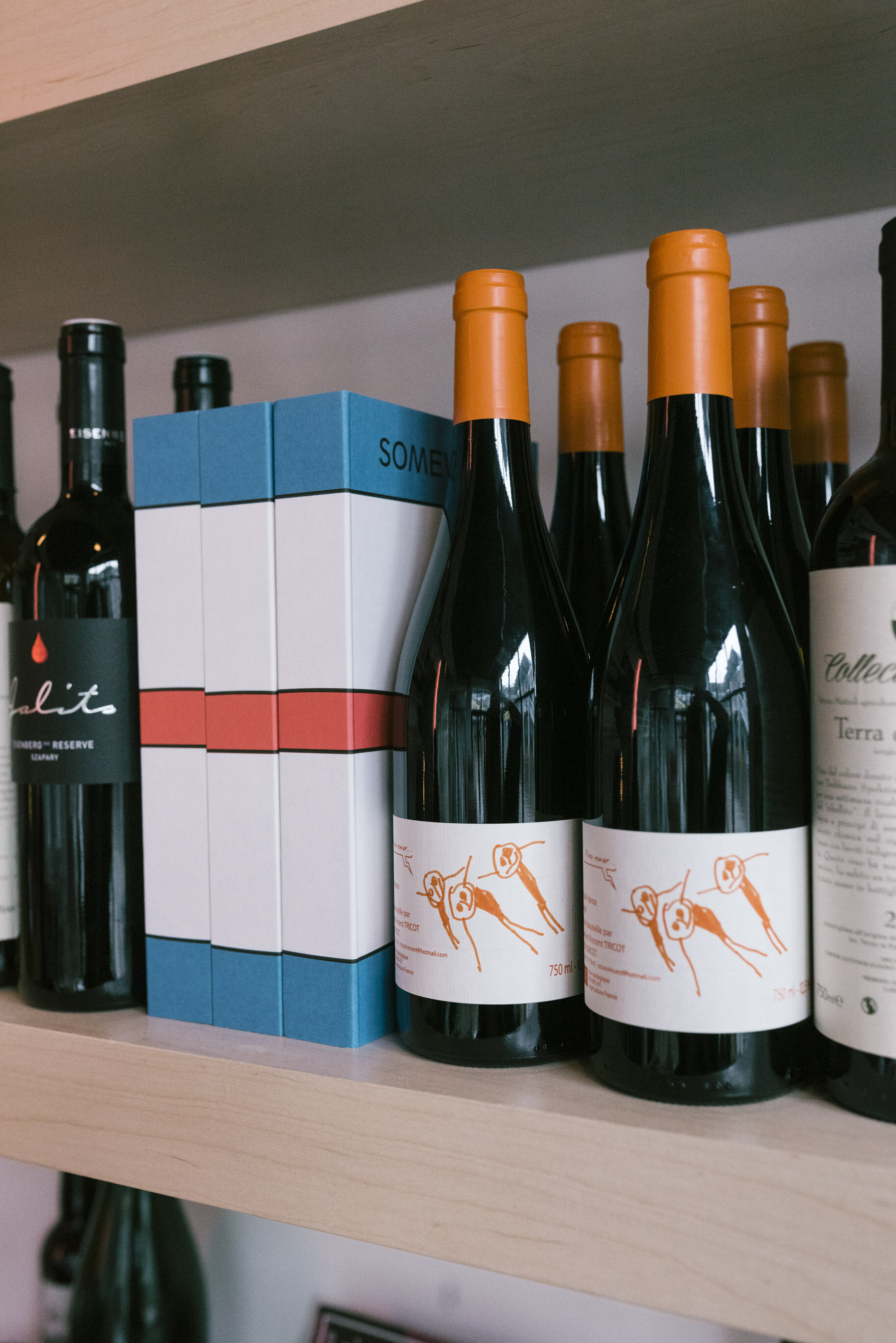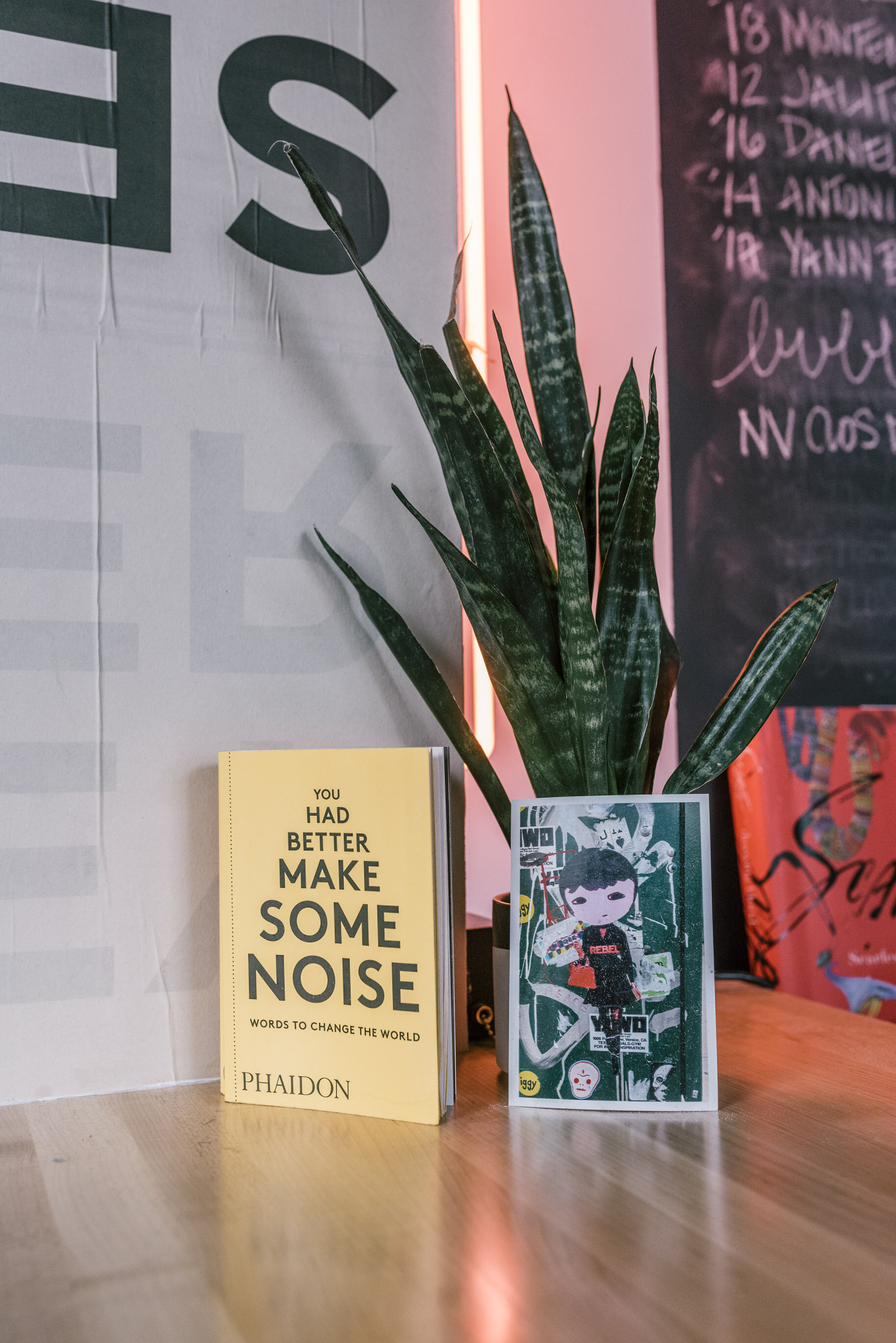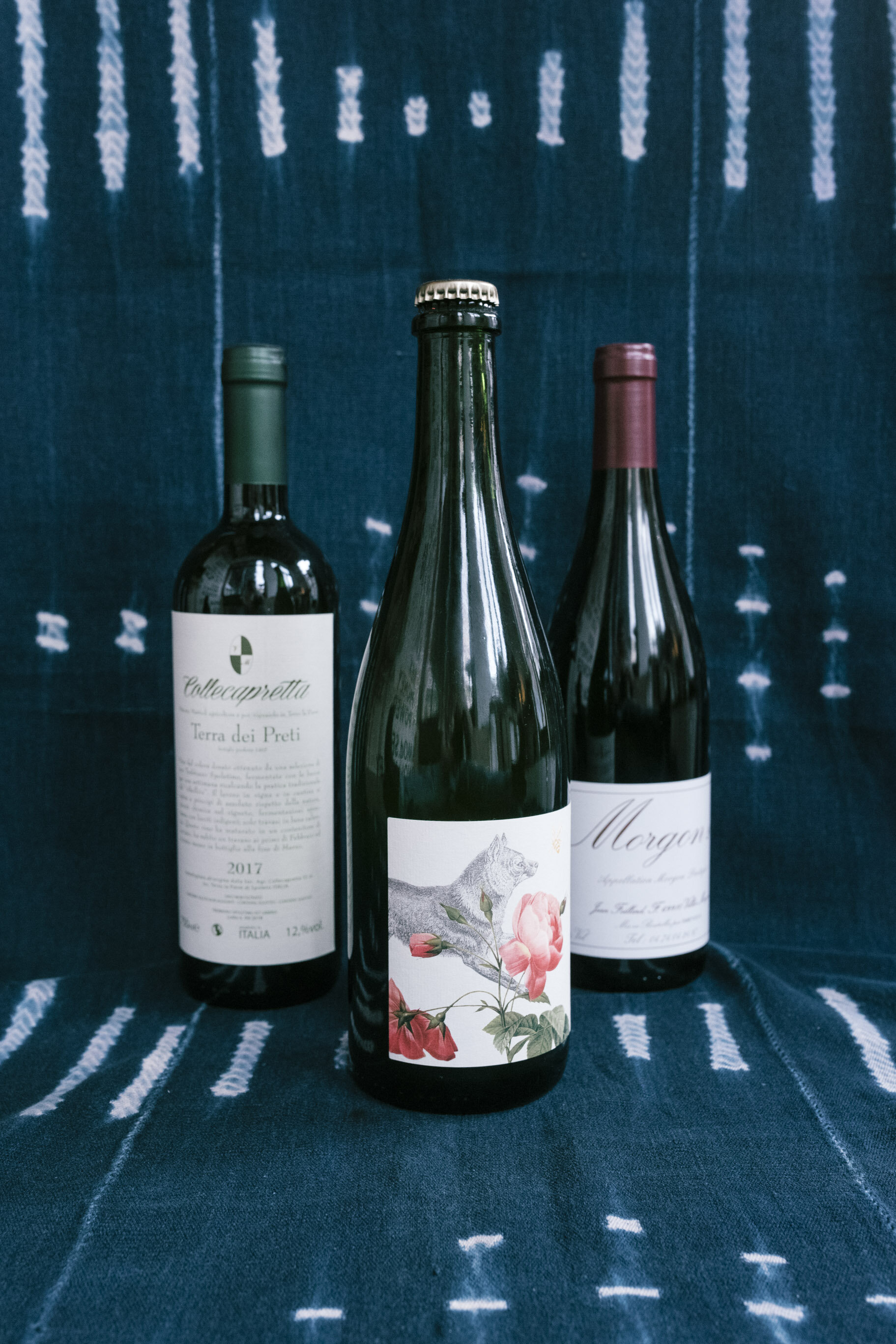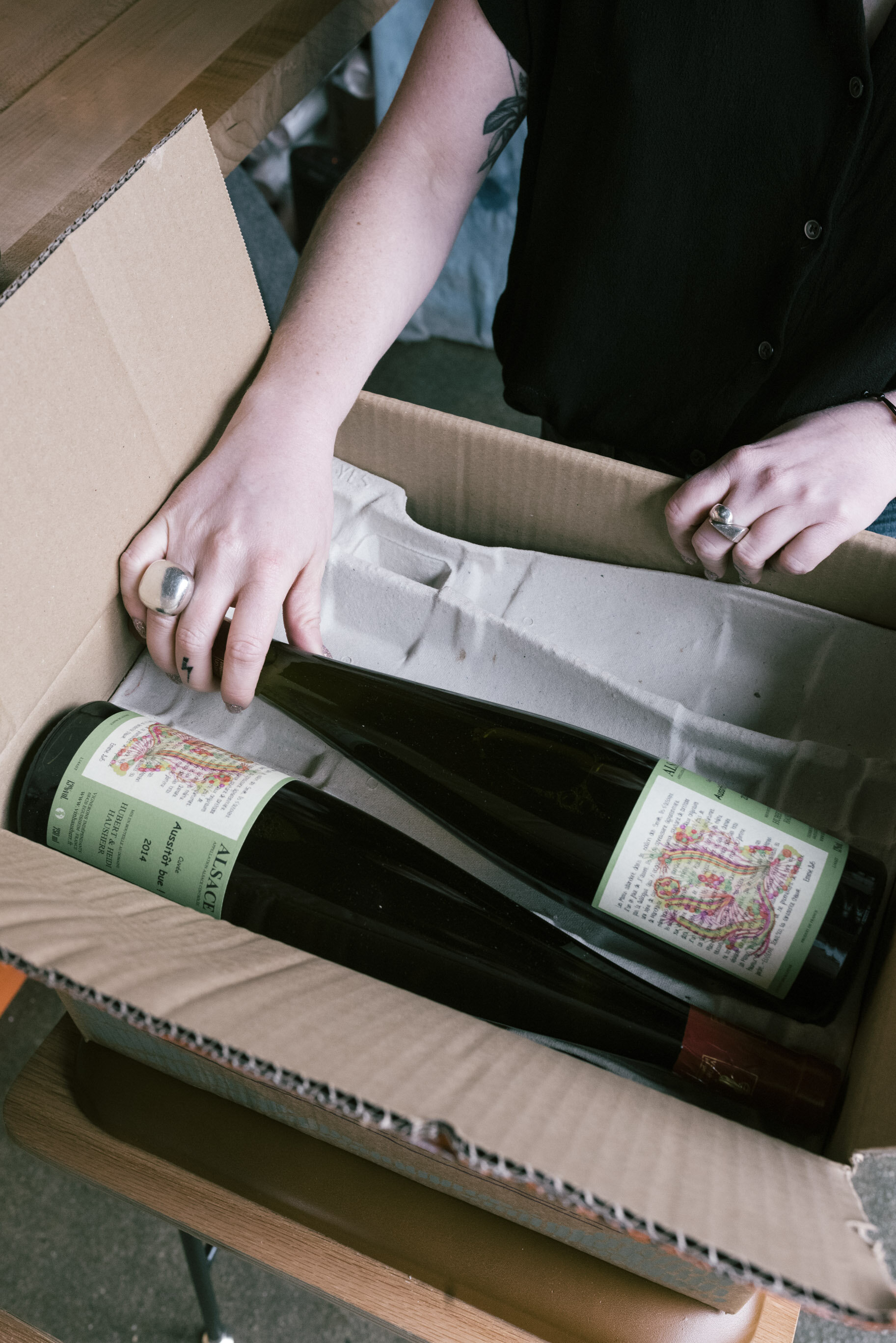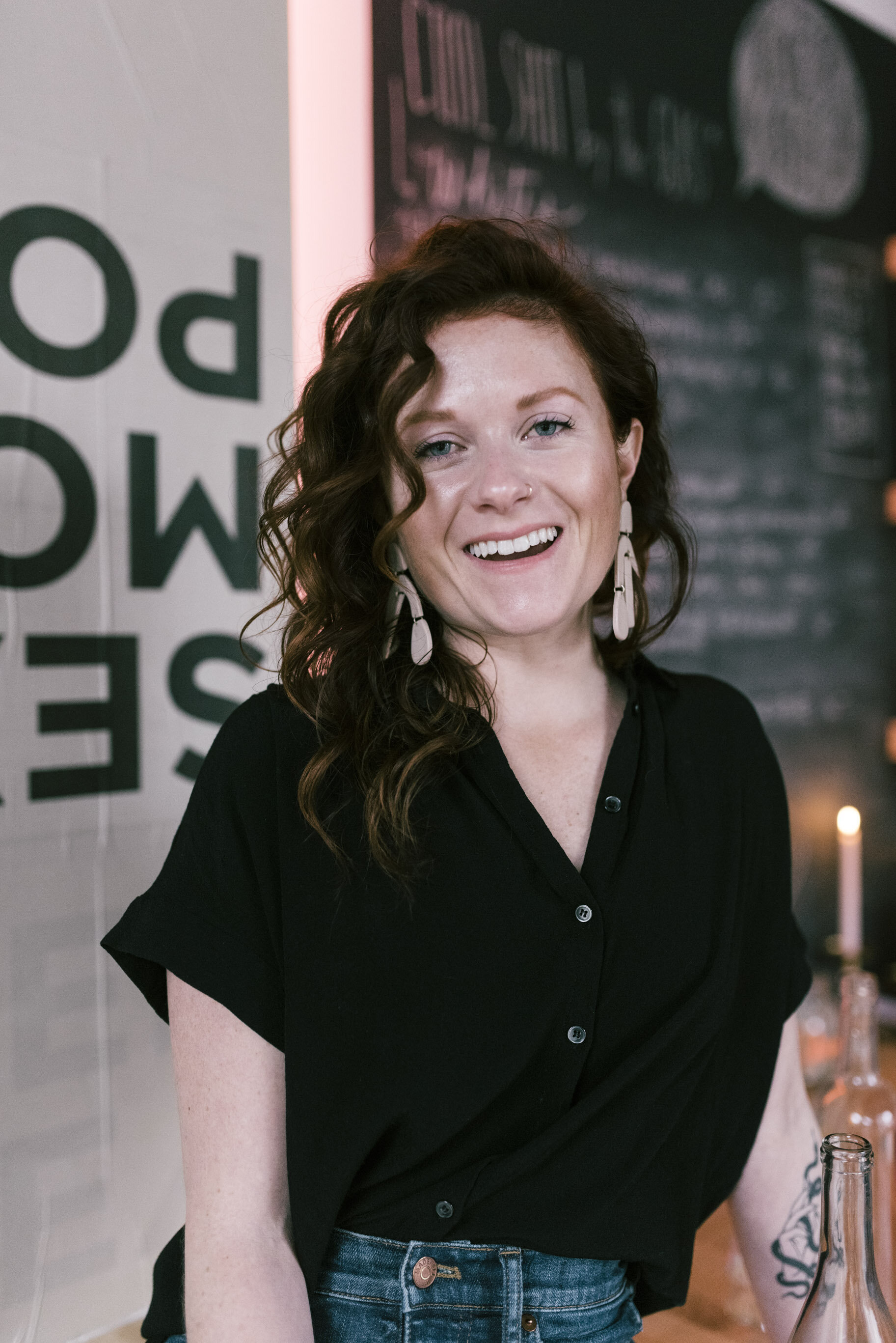Rebel Rebel’s Lauren Friel Talks Natural Wine and Pandemic-Inspired Pairings
Photos by Ella Rinaldo
Lauren Friel is a rebel with a cause: to make wine more approachable for all. Nestled in a cozy corner of Somerville’s Bow Market, Rebel Rebel is her haven for oenophiles who are more interested in what goes into their glass than fussy tasting menus or highbrow hangouts. The natural wine bar opened in the fall of 2018 and has been bringing bottles from small, hard-to-find producers to the Boston wine community ever since—always listing the evening’s rotating by-the-glass repertoire on a chalkboard. “I knew I wanted it to be something that Boston didn’t have,” says Friel, who was inspired by the wine bars of Europe when brainstorming the concept. “I wanted it to feel like casual wine bars in Paris and Spain and Greece and Italy…You can go and get a glass of wine with your people and hang out and not worry about anything and not spend a bunch of money to get really great stuff that you can't find anywhere else.”
Friel’s fascination with natural wine began around 2008 when she started as a server at Cambridge’s Oleana, which has close ties to local, sustainable agriculture through owner Ana Sortun, whose husband helms Siena Farms. “We already were aware of agriculture and how important it was to support small farms, and that is the same for wineries to support small vinicultural projects,” says Friel. “So that was already a focus, and natural wine naturally cleaves with that. It’s primarily concerned with responsible viniculture and transparency in terms of the wine-making process.” The grape guru soon climbed the ranks to become the restaurant’s wine director before moving on to curate lists for eateries including Sarma, Committee and the Michelin-recognized Dirty Candy NYC, accumulating accolades such as a spot on Wine Enthusiast’s Best 100 Wine Restaurants list and Boston Magazine’s Best of Boston award along the way.
With a name inspired by David Bowie’s hit song, Rebel Rebel was born from educational touchstones like Cambridge’s Violette Wine Imports and New York’s 10 Bells—both pioneers in the natural wine scene. The bar aims to eschew appropriately-named conventional wines in favor of a more holistic, sustainable and decidedly feminist approach to oenophilia. Natural wines are made using grapes that haven’t encountered pesticides, synthetic fertilizers or herbicides, with little to no additives or preservatives incorporated into the final product. While it’s understood that a conventionally-produced varietal might include some manipulation, vineyards aren’t required to report everything that goes into the bottle on their label—including potentially harmful chemicals. “There’s something about the lack of transparency there that really bothers me. We’re not even giving people the opportunity to be informed consumers, which feels really wrong and kind of immoral,” says Friel. “I think once you learn about the chemicals that go into the soil and the chemicals that go into conventional wines it’s hard to unlearn that and hard to want to drink or sell anything else.”
Not only do our bodies benefit from natural wine, but our land does as well. Many natural wines are made by small producers who employ polycultural agriculture practices—meaning their grapes mingle with a medley of other crops. This practice balances nutrients in the soil, aids in the repression of weeds and disease and also is more hospitable to bees and other helpful creatures by simulating an ecosystem similar to what would be found in nature. Many larger vineyards in popular wine-growing regions focus on cultivating grapes alone in a monoculture, which can have lasting negative effects on the richness of soil and also cause erosion and further the breakdown the natural environment.
Sustainability is paramount in the production of the bottles Rebel Rebel stocks, but the theme is also deeply rooted in the ethos of the bar in more ways than just agriculture. “We model our business around feminist principles,” says Friel. “We take that really seriously because, for me, that means a more sustainable life for all people.” She explains how the fundamentals of natural wine—supporting small and local businesses, responsible agriculture, respect for the body and respect for other people—reflect those she embodies in her business. Compared to the rigid, elitist culture that can be associated with the wine bars of yesteryear, the warmth, joy and community that radiates from Rebel Rebel is an unapologetic breath of fresh air in the beverage industry—and that, in itself, is pretty rebellious.
In the midst of COVID-19, Friel has been serving her community by offering a curated selection of bottles available for purchase at Rebel Rebel and also hosting Zoom classes that delve deep into unique varietals. “I will say we have been extremely lucky that the community of people that come to Rebel and who appreciate what we do have been supportive in ways I did not anticipate or expect,” says Friel. “I know that—whatever happens—this pandemic has given us the opportunity to see how much people do want us to make it and how much people do really appreciate and love what we do…If we get through this, it’s going to be our community that gets us through.”
Since wine has been an integral aspect of many of our quarantine diets, the vintage virtuoso was kind enough to offer up some pairings with another homemade social distancing staple: bread!
From biscuits to sourdough, here are five wine pairings with the most-loved loaves many have mastered through the pandemic, plus Edible Boston’s suggested recipes for each.
Focaccia (salty, herby)—“What grows together goes together, and there's nothing like a crisp and aromatic Italian Vermentino to match the rusticity of a crunchy focaccia! Look for bottles from coastal regions like Sardinia and Liguria for even more salty minerality!”
EB: Try Eva Katz’ easy Stuffed Focaccia with Mortadella, Escarole and Taleggio from our Summer issue; it’s versatile, so you can use whatever vegetables, salumi and cheeses you have on hand if going out for mortadella and taleggio are a heavy lift. It’s a great way to use up extra garden zucchini, and would be delicious using Fontina or provolone, bitter broccoli rabe with some dried chilies and garlic and a traditional sopressata piccante.
Sourdough (sour, chewy)—“I love an orange wine with sourdough! A little bit of skin contact goes a long way in meeting sourdough's tang head-on, and an orange wine's unique textural structure lends depth and complexity to the pairing, too.”
EB: If you’re one of the few Americans NOT in possession of a newly-minted stay-at-home-order sourdough starter, read Edible Boston contributor Andrew Janjigian’s #QuarantinyStarter Project for Cooks Illustrated and make your own Almost No-Knead Sourdough Boule. Also: Stay tuned for a new piece from Andrew in our Winter issue!
Biscuits (buttery, flakey)—“Sweet or savory, there's nothing like a little pét-nat with a buttery biscuit. The fresh fizz of these bottle-fermented bubbles is the perfect complement to a biscuit's richness, and they're both just the epitome of easy, approachable deliciousness. Always a favorite at the brunch table!”
EB: Waaaay back in our Winter 2013 issue, the late Elizabeth Gawthrop Riely wrote an ode to LARD and all the wonderfully flaky pastries one can make with it. Her recipe for Buttermilk Biscuits is still one of our favorites, made either with freshly rendered chilled lard or ice-cold pastured butter.
Depression-Era Peanut Butter Bread—(nutty, semi-sweet)—“If you want to match the deeper flavors and recall childhood memories of PB&J, an old-school California Zinfandel is just the thing. A favorite is Bedrock Old Vine Zin—ripe berry fruit notes are well-balanced by vibrant acidity, and while it's a bit of a cheeky pairing, who doesn't love PB&J?”
EB: Old Fashioned Peanut Butter Bread was all the rave on Reddit during the early stages of quarantine this spring, essentially because stay-at-homers could make it with easily accessible pantry staples—peanut butter, flour, baking soda, salt and milk. One of our go-to recipe sources (aside from our own website, of course) is Apartment Therapy’s thekitchn, and their version includes some helpful tips for success when baking up a loaf. (If you haven’t tried Smitten Kitchen’s 3-ingredient peanut butter cookies, now’s a good time to give that stalwart recipe a plug, too.)
Banana Bread (sweet, fruity)—“Go for an oloroso sherry to lend balance and notes of caramel and toffee to this pairing—oloroso's calling-card salinity makes this an even more indulgent match!”
EB: There’s no better banana bread recipe than the one found in Flour Bakery: Spectacular Recipes from Boston’s Four Bakery and Café. Joanne Chang’s confection from her first book is the only one you’ll ever need to make: It’s just sweet enough to make it more dessert than breakfast, so it’s a natural with the sherry Lauren suggests above, and the crumb is both tender and light. I imagine it has something to do with whipping the sugar and eggs a full 10 minutes before adding the remaining ingredients, including decadent crème fraîche and heady vanilla. We can’t recommend that book highly enough!
This story appeared as an online exclusive in August 2020.



